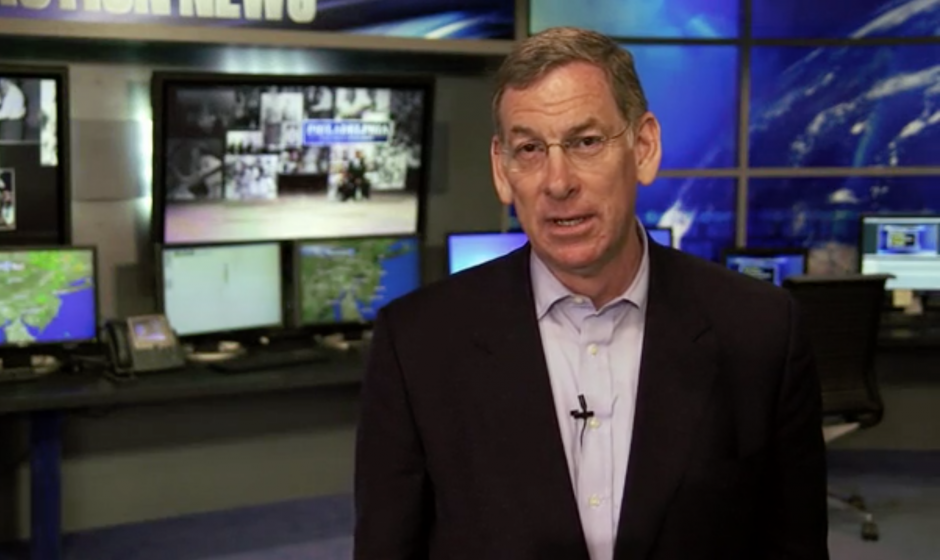Is Sam Katz About to Run for Mayor?

Sam Katz pitching a fundraising campaign for his documentary series on the history of Philadelphia.
Sam Katz, who has run for mayor three times and very nearly won once, sounds like a man positively itching to give it a go one more time.
Granted, getting elected mayor is an itch Katz has had pretty much his entire adult life. But the weakness of the existing mayoral field has to be sorely tempting for Katz, and sources say that he has begun loosely discussing the possibility with a few power players, including City Council President Darrell L. Clarke.
The surprise withdrawal yesterday of Ken Trujillo from the mayoral race changes the dynamics of the campaign a bit, and could create an opening for any number of new contenders, Katz included. To date, speculation about a Katz candidacy has generally assumed the former Republican would run as an Independent in November election, particularly if the Democratic primary victor is State Sen. Anthony Williams.
But what if Katz were to run as a Democrat instead?
Katz was cagey yesterday when asked about his intentions. But he was happy to engage in a completely theoretical discussion about the plusses and minuses a theoretical candidate might face running in a Democratic primary or as an Independent in the fall.
Right now, ironically enough, Katz is neither an Independent or a Democrat. He’s a Republican. Katz has switched registrations a number of times in recent years; so often, in fact, that he wasn’t immediately sure when asked what his current party affiliation was. Katz would have to change his registration before March 10, at the very latest, in order to run in the Democratic primary, said City Commissioner Al Schmidt.
So, why might Katz a theoretical candidate with loose party loyalties opt to run as a Democrat instead of as an Independent?
“Historically, the last Independent elected mayor was Rudolph Blankenburg in 1911,” Katz said. “So an Independent has to tell a story that won’t find a lot of easy subscribers because you’d be talking about doing something that hasn’t been done in 104 years.”
Philadelphia is also an overwhelmingly Democratic city. Democrats have a nearly 8-1 registration edge over Republicans, and a nearly 10-1 edge over Independent voters. Katz came awfully close to bucking those odds in 1999, when he ran as a Republican and lost to John Street by just 7,200 votes. But Street was a highly polarizing figure. So maybe Katz would have a better shot this time by registering in the party that a huge majority of city voters belongs to?
Maybe. Maybe not.
“From a governance point of view there’s a real advantage to being an Independent. People are sick of partisanship. Not that Philadelphia isn’t a Democratic city. It certainly is,” Katz said. “But there are people who are disaffected and who think of themselves as Independent. Not all people, but most people. Recently arrived Philadelphians; immigrants, millennials and empty nesters clearly think of themselves as Independent because they’re not, for the most part, part of the establishment.”
The flip side, of course, is that Independent candidacies are inherently harder to take seriously, as Katz acknowledges. “Skepticism would be rampant. Something would have to happen relatively quickly that would help douse that skepticism.”
What conditions might Katz a theoretical Independent candidate look for when weighing a run?
“Whether it’s me or someone else, how did the Democrat win? What sort of shape are they in? What sort of blood is dripping from them? How effectively can they put their party together?” Katz said.
Katz would obviously face huge challenges whether he were to run as a Democrat or as an Independent. He’s sought the mayor’s office three times before, and the voters have said no three times. He could be credibly attacked in a Democratic primary as an opportunist. It’s not clear he can effectively raise money under the new campaign finance limits. And he’s rather easily cast as the candidate of elitist Philly (when I mentioned the Katz possibilities to one operative, the operative cracked: “the squire of Mt. Airy is always listening for the call of the people”).
But I think it’s a mistake to underestimate Katz, particularly in a field as underwhelming as the existing one. Katz thinks deeply and broadly about Philadelphia, and he has many more provocative and potentially productive ideas about how to grapple with the city’s big problems than the declared candidates appear to have (so far, at least). Whether he were to win or lose, a Katz candidacy would surely be consequential. They always have been.